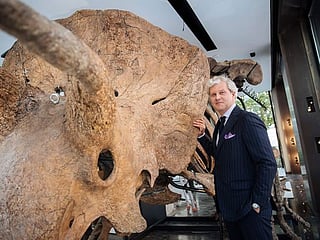Questions about Alec Baldwin shooting turn to assistant director
Investigators have not charged anyone or placed blame on any individual in the incident

In the frantic moments after Alec Baldwin shot the cinematographer and the director of a Western being filmed in New Mexico, a script supervisor on the set called 911 with a desperate plea for help.
“We’ve had two people accidentally shot on a movie set,” the caller, Mamie Mitchell, told the 911 operator. Then Mitchell singled out the film’s assistant director as she described how it was his responsibility to make sure such mishaps never happen. “He’s supposed to check the guns,” Mitchell said in the emergency call.
After 42-year-old cinematographer Halyna Hutchins died following the shooting Thursday, detectives from the Santa Fe County Sheriff’s Office began examining the role that the assistant director, Dave Halls, among others on the set, had in the incident. They learnt that Baldwin was told by Halls, who handed him the firearm, that it was a “cold gun,” according to court documents. A cold gun on a film set typically refers to a gun that’s unloaded.
Investigators have not charged anyone or placed blame on any individual in the incident. They also have not indicated what kind of projectile killed Hutchins.
On the issue of overseeing set safety, Halls, an industry veteran who worked on movies such as “Fargo” and “The Matrix Reloaded,” has been the subject of complaints from various film professionals for years. The complaints, which largely revolve around his regard for safety protocols and on-set behaviour, are fuelling questions about the New Mexico production, which was marked by at least two accidental gun discharges just days before the fatal shooting.
“Dave doesn’t always follow the rules,” said Antonia Bogdanovich, a director who worked with Halls on the crime caper “Phantom Halo.” Bogdanovich described how tempers had flared on the set after Halls, who was an assistant director on that film, pressured the crew to work beyond established timetables.
Halls didn’t respond to several attempts to reach him.
Crew walkouts
Similar problems plagued the set of “Rust,” the Western upended by the shooting, when six camera crew members walked out over late pay and working conditions just hours before the tragic episode. Bogdanovich said she was alarmed to find out about both the labour strife and that, according to the affidavit, Halls had handed a gun to Baldwin that resulted in the actor fatally shooting Hutchins.
“I’m a film director, and from what I know, there has to be several steps before actors are handed a gun,” Bogdanovich said. “Dave Halls needed to check if he’s going to tell an actor that it’s a cold gun. He needed to open up the chamber and check.”
In his affidavit, Detective Joel Cano said that Halls had grabbed one of three guns set up by the film’s armourer, Hannah Gutierrez-Reed. The guns were on a cart left outside a wooden structure because of COVID-19 restrictions, the detective said, before Halls handed one of the guns to Baldwin during a rehearsal. Gutierrez-Reed didn’t respond to requests for comment.
The disclosures are offering a glimpse into how guns are supposed to be handled on movie sets. Several professional armourers, who are experts in the handling of weapons, said it was their job to procure firearms and ensure they are safe to use, while assistant directors are supposed to inspect the guns and make sure they are not loaded; usually it is the armourer who then hands the gun to an actor.
Safety concerns
Larry Zanoff, an expert in the use of firearms on film sets who worked on the set of “Django Unchained” as an armourer, said that under industry standards, the first assistant director is the lead safety person on set, and commonly inspects a gun to ensure it is unloaded and safe to use.
Lisa Long, who worked with Halls as first assistant camera on a film shoot earlier this year, said she complained to her superiors several times throughout the process about what she had perceived as a lack of proper safety meetings and her concerns about breaches of COVID-19 protocols.
“Normally I’d go to the first AD with safety concerns,” Long said, referring to Halls’ role as assistant director, “but the safety concerns were about the first AD.”
While shooting the film, “One Way,” starring Machine Gun Kelly and Travis Fimmel, Long said that the crew shot a scene on an active highway without the proper preparation, and two of the vehicles narrowly avoided a crash.
“I don’t ever recall having a proper safety meeting,” she said of the production.
Similarly, Maggie Goll, a licensed pyrotechnician who works on television sets, said in a statement Sunday that Halls “did not maintain a safe working environment” in 2019 when he was first assistant director on the Hulu horror series “Into the Dark.”
According to the statement, which was reported earlier by CNN, safety meetings were “nonexistent” on set. She cited a particular instance in which another pyrotechnician was experiencing a health episode related to diabetes, saying that Halls and another production team member sought to push the filming forward despite the medical emergency.
“I continued to stand my ground as Dave kept trying to call for us to restart,” she wrote. Goll said she reported that situation to the production company, Blumhouse Television, and the Directors Guild of America.
A statement from Blumhouse said Halls had worked on two films that were part of the “Into the Dark” series and was not rehired. It said any complaints received by the studio regarding safety issues were “dealt with promptly.” The DGA, which counts Halls among its members, did not respond to a request for comment.
Clay Van Sickle, a movie industry armourer who worked on “Into the Dark,” said he was aware of the recent news of Goll’s complaints but had no problems himself with Halls during the production. Van Sickle also said that there is a culture of rushing and cutting corners from production in movies generally, and that the job of the armourer is to stand up to that.
On “Rust,” as on any film, Van Sickle said, there should be a direct chain of custody of the gun from the armourer to the actor, which apparently was not the case, according to a sequence described in the affidavit. “So many protocols were clearly missed,” he said.








